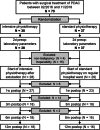Effects of intensive physiotherapy on Quality of Life (QoL) after pancreatic cancer resection: a randomized controlled trial
- PMID: 35534822
- PMCID: PMC9082826
- DOI: 10.1186/s12885-022-09586-1
Effects of intensive physiotherapy on Quality of Life (QoL) after pancreatic cancer resection: a randomized controlled trial
Abstract
Background: Patients have significantly lower QoL scores after pancreatic resection due to cancer in the physical and psychological domains compared to healthy controls or other cancer patients. Intensified physiotherapy or physical training can increase QoL by reducing fatigue levels and improving physical functioning. However, data on the long-term effects of intensive or supervised physiotherapy is lacking. The aim of this exploratory study is the assessment of QoL in the intervention group, using various QoL questionnaires in their validated German translations and gather data on its feasibility in the context of chemotherapy with a follow-up of 12 months (and develop concepts to improve QoL after pancreatic cancer resection).
Methods: Fifty-six patients (mean age: 66.4 ± 9.9 years) were randomized in this study to intervention (cohort A, n = 28) or control group (cohort B, n = 28). Intervention of intensified physiotherapy program consisted of endurance and muscle force exercises using cycle ergometer. In the control group physiotherapy was limited to the duration of the hospital stay and was scheduled for 20 min on 5 days per week. The clinical visits took place 2 days preoperatively, 1 week, 3 months, 6 months and 12 months postoperatively. Both groups attended the follow-up program. QoL was evaluated using the Short Physical Performance Battery (SPPB), Short Form-8 Health Survey (SF-8) and the European Organization for Research and Treatment of Cancer (EORTC) QLQ-C30 and pancreatic cancer-specific module QLQ-PAN26 questionnaires. The course of QoL was evaluated using a repeated measures ANOVA and a per protocol design.
Results: Of the initial 56 randomized patients, 34 finished the 12 months follow-up period. There were no adverse events due to the intervention and 80% of patients in the intervention group where adherent. There was no significant influence on physical performance as measured by SPPB and SF-8 questionnaire. However, after 6 months patients in the intervention group regained their prior physical condition, whereas the control group did not. Intensive physiotherapy significantly influenced various factors of QoL measured with the C30 questionnaire positively, such as physical functioning (p = 0.018), role functioning (p = 0.036), and appetite loss (p = 0.037), even after 6 months. No negative effects in patients undergoing chemotherapy compared to those without chemotherapy was observed.
Conclusion: This first randomized controlled study with a 12-month follow-up shows that supervised physiotherapy or prescribed home-based exercise after pancreatic cancer resection is safe and feasible and should be proposed and started as soon as possible to improve certain aspects of QoL.
Trial registration: German Clinical Trials Register (No: DRKS00006786 ); Date of registration: 01/10/2014.
Keywords: Early mobilization; Home-based exercise; Long-term follow-up; QLQ-C30; QLQ-PAN26.
© 2022. The Author(s).
Conflict of interest statement
The authors declare that they have no competing interests.
Figures




Similar articles
-
Progressive postresection program (pPRP) after pancreatic resection: study protocol for a randomized controlled trial.Trials. 2016 Feb 10;17:74. doi: 10.1186/s13063-016-1200-0. Trials. 2016. PMID: 26863867 Free PMC article. Clinical Trial.
-
Health-related quality of life after pancreatic resection for malignancy.Br J Surg. 2016 Feb;103(3):257-66. doi: 10.1002/bjs.10032. Epub 2015 Nov 19. Br J Surg. 2016. PMID: 26785646 Clinical Trial.
-
Erratum.Mult Scler. 2016 Oct;22(12):NP9-NP11. doi: 10.1177/1352458515585718. Epub 2015 Jun 3. Mult Scler. 2016. PMID: 26041800
-
Landscape of Health-Related Quality of Life in Patients With Early-Stage Pancreatic Cancer Receiving Adjuvant or Neoadjuvant Chemotherapy: A Systematic Literature Review.Pancreas. 2020 Mar;49(3):393-407. doi: 10.1097/MPA.0000000000001507. Pancreas. 2020. PMID: 32132518 Free PMC article.
-
Quality of life assessment in Hodgkin's disease: a new comprehensive approach. First experiences from the EORTC/GELA and GHSG trials. EORTC Lymphoma Cooperative Group. Groupe D'Etude des Lymphomes de L'Adulte and German Hodgkin Study Group.Ann Oncol. 1998;9 Suppl 5:S147-54. doi: 10.1093/annonc/9.suppl_5.s147. Ann Oncol. 1998. PMID: 9926255 Review.
Cited by
-
Effects of Exercise Training on Patient-Specific Outcomes in Pancreatic Cancer Patients: A Scoping Review.Cancers (Basel). 2023 Dec 18;15(24):5899. doi: 10.3390/cancers15245899. Cancers (Basel). 2023. PMID: 38136443 Free PMC article.
-
Physical activity and pain in people with cancer: a systematic review and meta-analysis.Support Care Cancer. 2024 Feb 6;32(3):145. doi: 10.1007/s00520-024-08343-3. Support Care Cancer. 2024. PMID: 38321248 Free PMC article.
-
Global status of research on gastrointestinal cancer patients' quality of life: A bibliometric and visual analysis from 2003 to 2023.Heliyon. 2023 Dec 6;10(1):e23377. doi: 10.1016/j.heliyon.2023.e23377. eCollection 2024 Jan 15. Heliyon. 2023. PMID: 38148818 Free PMC article.
-
Analysis of physical activity levels and influencing factors in cancer survivors after pancreaticoduodenectomy.Front Oncol. 2025 Jan 16;14:1428884. doi: 10.3389/fonc.2024.1428884. eCollection 2024. Front Oncol. 2025. PMID: 39886671 Free PMC article.
-
Effect of exercise based on the ACSM recommendations on fatigue in patients with digestive tumors: a meta-analysis of randomized controlled trials.J Cancer Surviv. 2025 Apr 4. doi: 10.1007/s11764-025-01780-x. Online ahead of print. J Cancer Surviv. 2025. PMID: 40184021 Review.
References
Publication types
MeSH terms
Grants and funding
LinkOut - more resources
Full Text Sources
Medical

